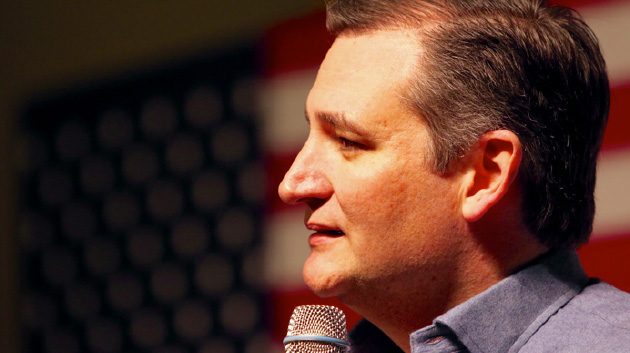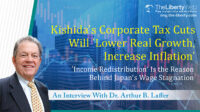Tax Reduction Will Lower Government Debts
The CNN Debate and the Potentials of Tax Reduction
The U.S. is now working on radical tax policy amendments to lower what was the world’s highest deferral corporate income tax rate from 35% down to 20%, and change the income tax divisions.
Some, however, are skeptical about the personal benefits of a lower corporate tax and wary that lowering taxes may result in higher government debts. This anxiety about increasing government debts is the primary argument against Trump’s tax reduction policy.
A country such as Japan faces more serious government debts with a total of JPY1.1 quadrillion (230% of the GDP), becoming the largest government debt amongst developed nations. In comparison, the ratio of debts to GDP in the U.S. is 107%. Just like many Americans, the Japanese citizens are being fooled into thinking that the debt cannot be paid off without raising taxes.
In the CNN debate covered Senators Bernie Sanders and Ted Cruz thoroughly discussed government debt and tax reduction. We will look at the ideas that emerged in this debate to think about the purpose and potential of tax reduction.
Tax Reduction Increases Everyone’s Income Including the Poor
“Recent projections estimate that the tax framework currently under consideration would add $2.4 trillion to the debt over the next 10 years.” A question was thrown at Cruz during the debate, “What steps will you take to ensure that the tax reform doesn’t add to the debt burden my generation is already facing?”
“The only force big enough to turn the debt around is economic growth,” Cruz answered. “From 2008 to today, economic growth has averaged 1.2 per cent a year. It’s been miserable under the Obama economy. The average since World War II has been 3.3 per cent”.
He then drew on various examples as evidence that tax reduction brings economic growth and higher private income, thus:
- President Kennedy’s (active 1961-1963) tax cuts resulted in economic growth and federal tax revenues increased from US$49 billion to US$87 billion.
- President Reagan’s (active 1981-1989) tax cuts brought an economic boom and federal tax revenues increased from US$347 billion to US$549 billion.
- “Under Obama, median income increased 6 per cent. Under Reagan, 17 per cent.”
- “How about women? Under Obama, median income increased 6 per cent. Under Reagan, 25 per cent.”
- “Young people: under Obama, 9 per cent, under Reagan, 55 per cent.”
- For the people struggling in the bottom, 20% “Under Obama, 12 percent, under Reagan, 40 percent.”
Evidence was on Cruz’s side: radical tax reforms will increase economic growth and therefore tax revenue, and people reap those benefits — all without the need to raise minimum income or redistribute wealth.
Martin Feldstein, Harvard professor and President Reagan’s former economic advisor, calculated that cutting corporate taxes will raise the sum total of American personal income by US$50 billion per annum. That means an increase by US$3500 per household income.
Additionally, an increase in corporate income will increase corporate tax revenue, which will completely pay off all government debts within 10 years.
Tax Increases Without Public Consent Opposes Popular Sovereignty
Japan plans a tax raise for 2019, but looking at the positive effects of Reagan and Kennedy’s tax cut policies on the economy, Japan’s raises will most definitely bring negative results.
In fact, the very idea of trying to pay off government debts through a tax increase goes against the principles of popular sovereignty, that is, the idea that sovereignty rests with the people. The reason is because it is not done through the consent of the people.
17th century philosopher John Locke, who proposed the idea of “life, liberty and the pursuit of happiness”, held that since the people created the government for their own security, the government is obliged to gather public consent. The government, while being the highest state authority, cannot deprive the people of their rights and property. In fact it must protect it.
Locke explained thusly: “for the rulers, in such attempts, exercising a power the people never put into their hands, (who can never be supposed to consent that any body should rule over them for their harm) do that which they have not a right to do.”
In other words, the people have a right to object to forces that threaten their God-given law of personal security and property. Locke called this the ‘right of rebellion’. The people temporarily entrust the government with their sovereignty in exchange for the security of personal property; if the government were ever to break this balance, it would be a breech of faith against the people.
This sort of situation would justify a revolt aimed at retrieving a society where freedom is secured. The people do not need a government that will jeopardize their property and happiness.
The American Founding Fathers began a country on the Lockean ideal of the freedom of property. They founded the country upon a powerful conviction that they could set an example for the rest of the world.
Sanders Reflects Marxism
The argument sustained by Sanders in the CNN debate dismisses the founding spirit of the U.S. Sanders proposed to target his tax reforms to heavily tax “the top 0.1%”. From Cruz’s data that tax cuts brought more wealth into the lower and middle classes, however, Sanders is completely wrong to assert that “what we have seen is a massive transfer of wealth from working families to the top 0.1 per cent”.
Sanders’ argument conforms to Marx’s idea that “The history of all hitherto existing society is the history of class struggles”: in other words, the conflict between the ‘haves’ and the ‘have-nots’.
Just like Marx realized that poverty could become a powerful political force, Sanders knows that fanning the flames of dissatisfaction and jealously amongst the poor will bring him unrivalled political support.
Encouraging class conflict, however, will never lead the people to mutual amity. Let us not forget that politicians are responsible for increasing the happiness of ALL people.
People Know How to Spend Their Money
“Bernie and the Democrats believe government knows best,” Cruz said as his closing remarks in the debate session.
“I’ll tell you what I believe: that you know better how to spend your hard-earned money than the government does, that you need to spend it to pay for braces for your kids, that you need to spend it to pay for new tires on your truck, or to save for retirement, or to start a business”.
Indeed, this mistaken notion that ‘the government knows best’ is the principle behind welfare states and big government. It justifies them taking money from the people and redistributing it. Intelligent people fall into the trap of thinking they know everything, and this arrogance leads to the establishment of a centrally planned economy.
A planned economy will always fail, because the centralized state will never be able to know and therefore supply each person’s individual demands, be they braces or new tires.
A welfare state is the same: a handful of officials enforce upon the people what they think is best. The government bypasses the opinion of the people to decide everything they consider important. This is the polar opposite of the free enterprise system: this is socialism.
Some politicians and critics in Japan propose the need to raise the consumption tax to 30% in order to improve social welfare. If Japan continues to aim for social welfare policies like those in Scandinavia, the state will shift towards big government.
A heavy-tax state, regardless of whether it is a democracy or not, will inevitably become an oppressive and controlling socialist state. We must all stop to think and choose our ideal lives: a life decided and regulated by the government, or a life where we create our own future. (Hanako Cho)



















